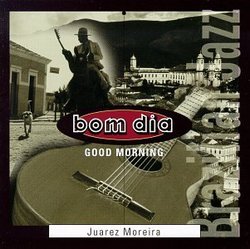| All Artists: Juarez Moreira Title: Dom Dia Members Wishing: 0 Total Copies: 0 Label: Malandro Records Original Release Date: 5/12/1998 Release Date: 5/12/1998 Genres: International Music, Jazz, Pop, Latin Music Styles: South & Central America, Brazil, Brazilian Jazz, Jazz Fusion Number of Discs: 1 SwapaCD Credits: 1 UPC: 618377100324 |
Search - Juarez Moreira :: Dom Dia
 | Juarez Moreira Dom Dia Genres: International Music, Jazz, Pop, Latin Music
|
Larger Image |
CD Details |
CD ReviewsMining Minas - introducing Juarez Moreira?s ?Bom Dia? B. Lehmann | Massachussets, USA | 12/01/2000 (4 out of 5 stars) "In recent years Brazilian music has experienced an incredible upswing in popularity, not only due to its abundant creative energy but also driven by an increasing awareness among curious audiences worldwide as well as a steady stream of first-rate releases, sometimes reintroducing the already established to fresh ears, but also - and even more importantly - breaking grounds for new artists that might have eluded - stateside - attention so far. Such is the case with guitarist and composer Juarez Moreira, whose fourth release "Bom Dia" has now been released internationally by Rick Warm's Malandro Records, an emerging label of outstanding original musical and aesthetic vision. It's not that Moreira, at age 44, hasn't been around that long - on the contrary, he has had a successful career performing with stellar musicians such as Milton Nascimento, Wagner Tiso, Maria Bethania, Toninho Horta or Paulo Moura, many of which have been longtime colleagues from his home state of Minas Gerais, the mountainous, landlocked region north of Rio and São Paulo. Unlike the bustling and more extroverted coastal regions or Bahia, the spirit of Minas always seems to have been one of mystical complexity, introspection and a certain pastoral somberness, reflective perhaps of the vastness of the landscape or the suffering of its people, born out of the pain of the hard and ungratifying labor connected with its major industry, the expansive mining of gold and diamonds. In musical terms, it has been almost unrivaled in diversity and imagination, drawing on standard forms of Brazilian Music like samba, bossa or choro, but also featuring styles such as toada, forró, musica sertaneja and classical vocal music sung in its baroque churches, alongside American pop and jazz. "Bom Dia's" thirteen original compositions encompass all these elements, creating a masterful blend of Brazilian tradition with contemporary jazz. On the title track, a few motifs of enchanting simplicity get tossed around until Moreira's warm and fluid sound on electric guitar ( he cites a close affinity to Wes Montgomery and George Benson ) takes center stage in a solo of relaxed lyricism. "No matter what Brazil thinks, Brazilian Music is soft, which is neither good nor bad", the guitarist explains in a recent interview, most likely alluding more to its melodic and rhythmic pliancy paired with lush harmonic sophistication than, let's say, volume levels. Perhaps most exemplary in that sense is Moreira's "Samba pra Toninho", whose winding elongated melodic phrases and unconventional harmony - much like the compositions of fellow Brazilian guitarist Toninho Horta ( who's making a guest appearance on this cut ) - skillfully defy gravity. A single rhythmic motif carved from the accented pulsation of the forró is set against a tapestry of floating chords on "Baião Barroco", while the short and sweet "Chora Jazz" seems to glow with the melancholic nostalgia of fin-de-siecle Rio, featuring legendary Choro-virtuoso Paulo Moura on alto sax. The guitarist's "Choro para Piazolla" on the other hand transcends that genre, paying tribute to the late bandoneonist's `Nuevo Tango'. Nowhere would Juarez Moreira's mature lyricism be more evident than in the subdued expressiveness of his ( almost ) unaccompanied three solo pieces, surely one of the qualities evolving from his admiration of the works of Bill Evans, Jobim, Miles or Villa-Lobos. "Pas de Deux", "Chaplin" and the haunting Jobim ballad "Sabia" are wonderful miniatures of introspective beauty, cut out to stand by themselves - more transparent perhaps even without the added keyboard sprinkles. "Depois do Amor", "No Desafio do Mar" as well as the Metheny-ish "Último Adeus" surprise as soulful ballads with a pop edge, but the celebratory, propulsive drive of Moreira's composition "Diamante", initially recorded by Toninho Horta on his own 1988 CD "Diamond Land", conjures up the most vivid musical images of Minas, its vocalese, soaring lines rising as if they were expecting Milton's high falsetto to join in any second. Bassist Zeca Assumpção opens this track with a brief introduction, making this listener long for some more solistic space to be given to this superb cast of musicians, which also include keyboardists André Dequech and Cliff Korman, bassist Ezequiel Lima and drummer Esdra Ferreira."
|

 Track Listings (14) - Disc #1
Track Listings (14) - Disc #1